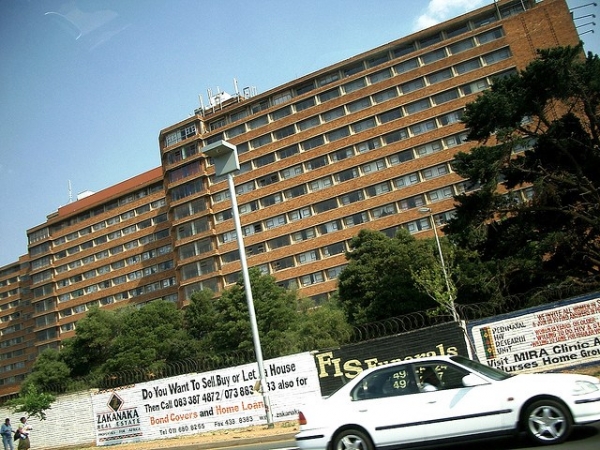
Chris Hani Baragwanath Hospital. Photo by Flickr user Sea Turtle (CC BY-NC-ND 2.0)
8 November 2016
The “explosion” of litigation is “one of the biggest threats to the sustainable improvement in health care,” Health Minister Aaron Motsoaledi warned last week.
Addressing the International Hospital Federation (IHF) World Hospital Congress in Durban, Motsoaledi said, worldwide, such litigation was draining resources away from clinical care and also driving specialists away from certain fields of practice.
Patient-centred care and safety was the theme of this year’s IHF congress.
The minister said that the South African National Development Plan identified two main objectives: the quality of services in the public health system had to be improved and the relative cost of private health care must be reduced.
Medical negligence claims against the KwaZulu-Natal Department of Health were close to R1 billion. Prince Mshiyeni Memorial Hospital was facing the biggest number of claims, 16, totaling more than R100 million. King Edward VIII Hospital faced 10 lawsuits amounting to R62.8 million, followed by Addington with 15, totaling R47.2 million.
Between the 2013/14 and the 2014/15 financial years, the department of health in Mpumalanga faced 343 legal cases totaling R2.9 billion.
The Gauteng health department faced negligence claims amounting to R1.28 billion for the 2012/2013 financial year. Already in 2005, the department expressed concern about complaints of malpractice, which had led to lawsuits of R216 million in the previous five years.
The Eastern Cape faced claims of R876 million.
Claims range from children blinded at childbirth to pensioners dying from infections their families claim they acquired in hospital.
Veeshan Singh of Newlands in Durban lodged a damages claim for R23.9 million against the MEC for Health in KZN on behalf of her son, Shirdesh, who was made permanently blind, allegedly due to negligence of medical staff following his premature birth at Addington Hospital in 2006.
In 2013, a couple whose child was born with Down’s Syndrome in 2002 was awarded R6.6 million in damages by the Pietermaritzburg High Court which ordered that the provincial office of the premier pay R4.4 million to the couple as it controlled Addington Hospital where the baby was born. The eThekwini Municipality was ordered to pay R2.2 million because it ran the Clare Estate clinic, where the monitoring of the mother’s pregnancy took place. The couple said had they been made aware of the problem on their many visits to the clinic, they would have terminated the pregnancy.
Also in 2013, the KwaZulu-Natal Department of Health accepted liability in a medical negligence suit concerning the permanent loss of sight of a child, born prematurely, who was treated at Port Shepstone Regional and Inkosi Albert Luthuli Hospitals.
The mother asked the court to award her R15.5 million in damages. The court heard that after his birth, the child was transferred between Port Shepstone Regional and Inkosi Albert Luthuli Hospitals on various occasions. It is claimed that the staff at both these hospitals failed to monitor him adequately for a condition known as Retinopathy of Prematurity. It is alleged that his oxygen levels were not properly monitored and that his mother was not advised to return to the hospital for regular eye check-ups.
Addington Hospital is also being investigated by the Human Rights Commission after cancer treatment at the hospital stopped early in 2013 when the hospital stopped operating two radiotherapy machines. The company which installed the machines stopped servicing them in January because the department had failed to pay the maintenance contract nine months earlier in March 2012.